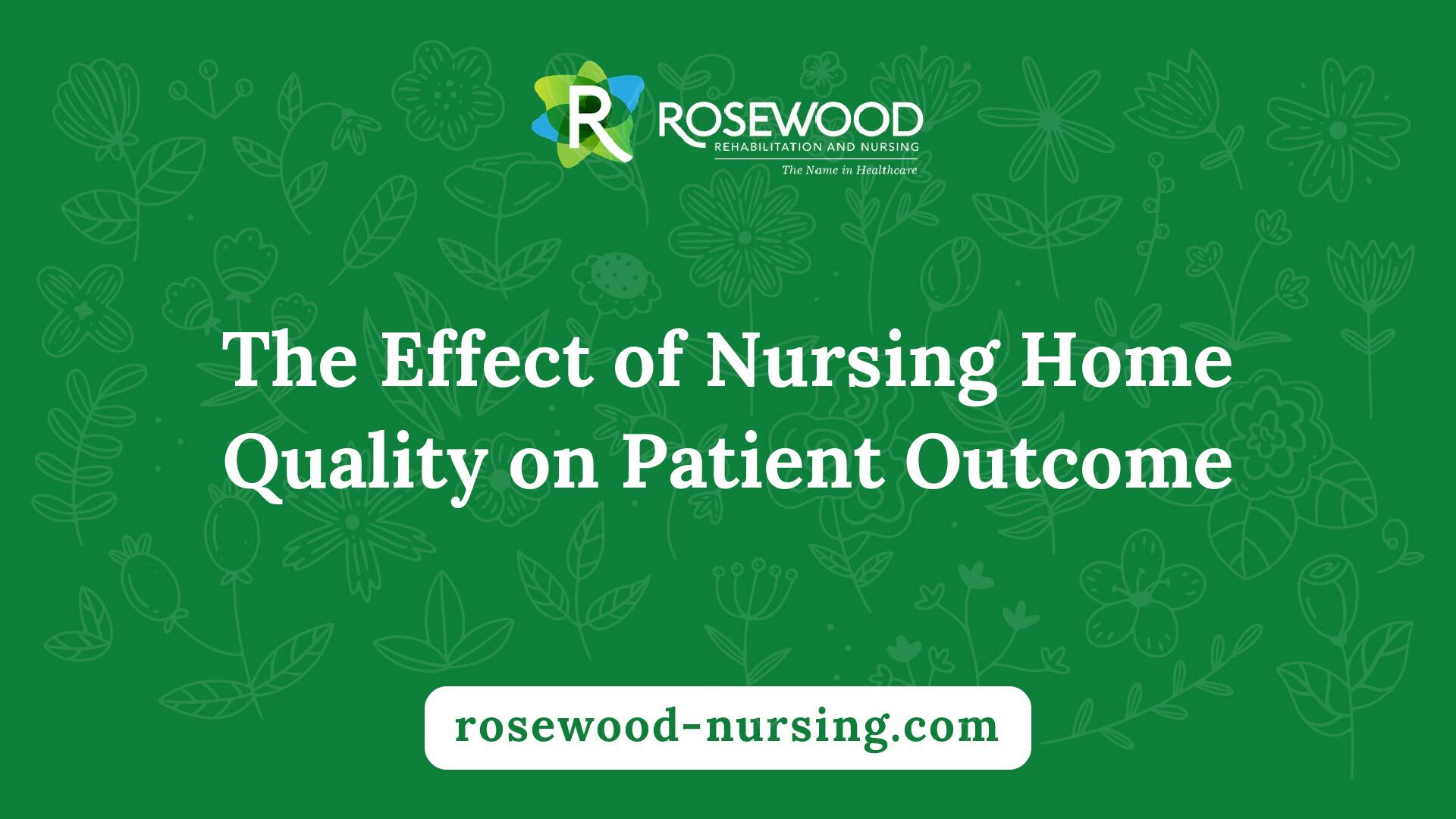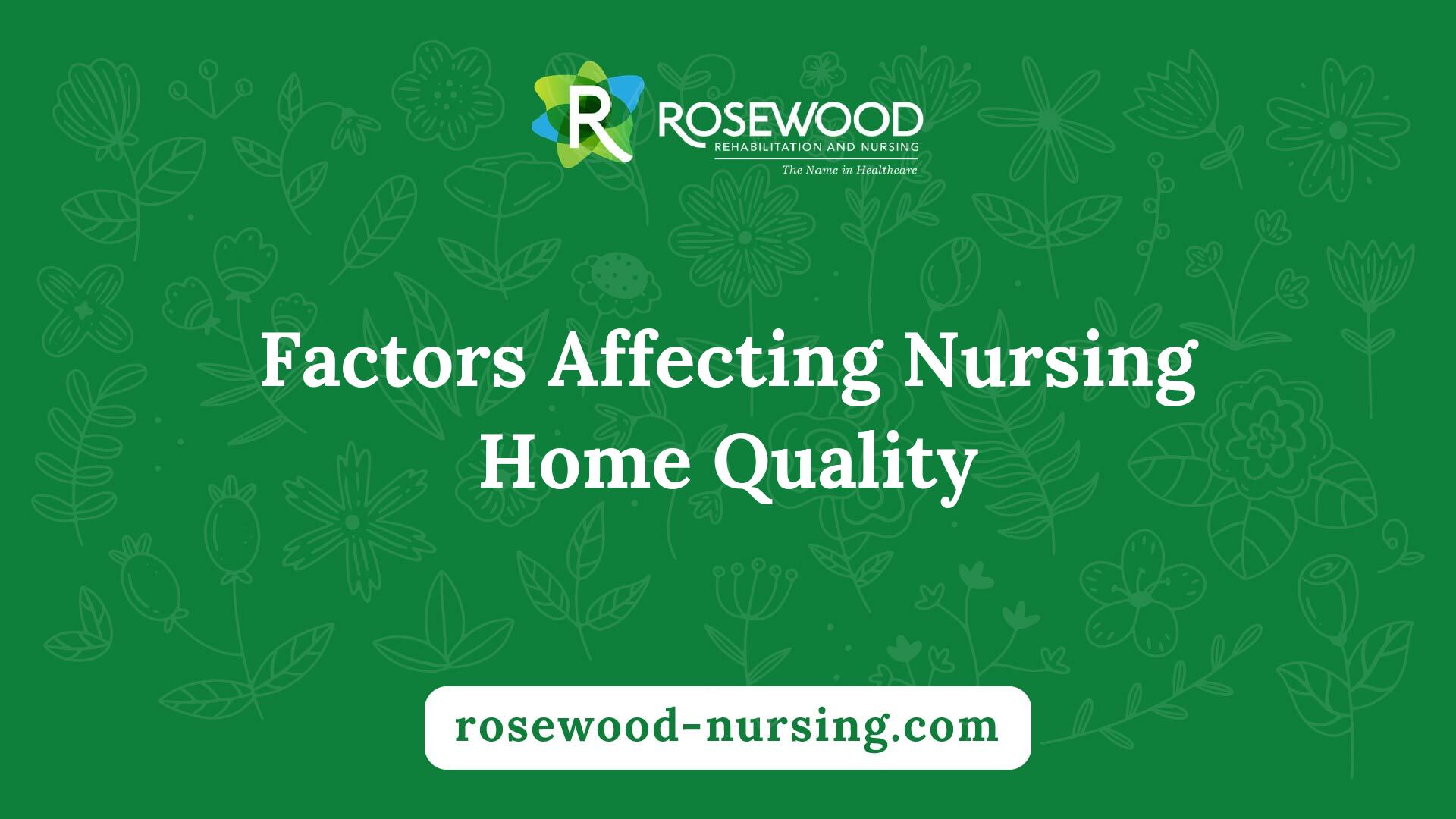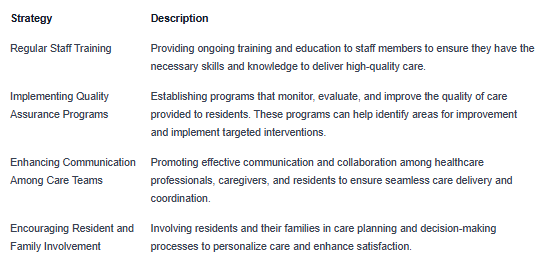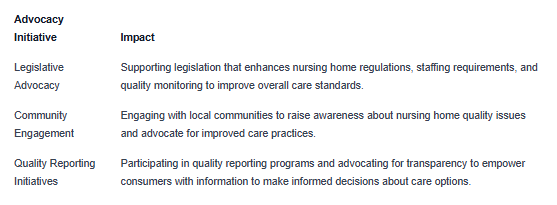The Effect of Nursing Home Quality on Patient Outcome
March 4, 2025
Unveil how nursing home quality impacts patient outcomes. Discover strategies to enhance care quality.

Understanding Nursing Home Quality

In the realm of nursing homes, the concept of quality plays a significant role in shaping patient outcomes. It is essential to grasp the definition of nursing home quality and recognize the paramount importance of quality in providing optimal patient care.
Definition of Nursing Home Quality
Nursing home quality refers to the standard of care and services provided to residents within a nursing home facility. It encompasses various aspects, including the environment, staff interactions, medical treatment, safety measures, and overall well-being of the residents. High-quality nursing homes are characterized by compassionate and competent staff, adherence to clinical best practices, cleanliness and hygiene standards, and a focus on promoting the physical and emotional well-being of residents.
Importance of Quality in Patient Care
The quality of care delivered in a nursing home setting directly influences the health outcomes and overall experiences of the residents. Ensuring a high level of quality in patient care is essential for promoting recovery, maintaining health, and enhancing the quality of life for individuals residing in nursing homes. Quality care not only addresses the medical needs of the residents but also considers their emotional and social well-being, fostering a supportive and nurturing environment.
To quantify the impact of nursing home quality on patient outcomes, various quality indicators are employed to assess the effectiveness of care provided. These indicators serve as benchmarks for evaluating the performance of nursing homes and guiding efforts to enhance the quality of care delivered to residents. By understanding the significance of nursing home quality and its direct correlation to patient outcomes, stakeholders can work collaboratively towards improving the overall quality of care in nursing home facilities.
Factors Affecting Nursing Home Quality

When evaluating nursing home quality, several key factors come into play, influencing the overall standard of care provided to residents. Among the primary factors affecting nursing home quality are staffing levels and training, compliance with regulations, and facility cleanliness and maintenance.
Staffing Levels and Training
Staffing levels and the proficiency of the healthcare professionals in nursing homes play a pivotal role in determining the quality of care residents receive. Adequate staffing ensures that residents' needs are met promptly and effectively. Moreover, well-trained staff members are better equipped to handle the diverse healthcare requirements of residents, enhancing the overall quality of care.
Compliance with Regulations
Compliance with regulatory standards is essential for maintaining high-quality care in nursing homes. These regulations are in place to safeguard residents' well-being and ensure that the facilities operate according to established guidelines. By adhering to regulatory requirements, nursing homes can uphold a certain standard of care and provide a safe environment for residents.
Facility Cleanliness and Maintenance
The cleanliness and maintenance of nursing home facilities directly impact the quality of care provided to residents. A clean and well-maintained environment not only promotes the physical health of residents but also contributes to their overall well-being. Regular sanitation practices, proper maintenance of equipment, and a hygienic living space are vital for ensuring a high standard of care in nursing homes.
To assess the impact of these factors on nursing home quality, it is important to consider both qualitative and quantitative data. By analyzing staffing ratios, compliance records, and facility inspection reports, stakeholders can gain insights into the effectiveness of these factors in maintaining quality care standards within nursing homes. By addressing areas of improvement in staffing, compliance, and facility management, nursing homes can enhance the quality of care provided to residents and ultimately improve patient outcomes.
Impact on Patient Outcome
Unpacking the correlation between nursing home quality and patient outcomes sheds light on the critical connection between these components in healthcare settings. Assessing how nursing home quality influences patient health and the various quality indicators for patient outcomes provides valuable insights into the effectiveness of care provided.
Relationship Between Quality and Patient Health
The quality of care within nursing homes directly impacts the overall health and well-being of residents. Higher levels of quality care are associated with improved patient health outcomes, lower rates of complications, and enhanced quality of life for residents. Factors such as attentive staff, adherence to regulations, and a clean environment contribute to the positive relationship between nursing home quality and patient health.
Quality Indicators for Patient Outcome
Measuring patient outcomes in nursing homes involves assessing various quality indicators that reflect the effectiveness of care delivery. These indicators serve as benchmarks for evaluating the impact of nursing home quality on patient well-being. Common quality indicators for patient outcomes include:

By monitoring these quality indicators, healthcare providers and administrators can gauge the level of care provided in nursing homes and proactively address areas for improvement. Enhancing nursing home quality not only elevates patient outcomes but also promotes a culture of continuous quality improvement within the healthcare facility.
Challenges in Assessing Quality
Assessing the quality of nursing homes presents several challenges that can impact the accuracy and reliability of evaluations. Two key challenges in evaluating nursing home quality are the subjectivity in quality assessment and issues related to data availability and transparency.
Subjectivity in Quality Assessment
One of the primary challenges in assessing the quality of nursing homes is the subjective nature of quality assessments. Quality in healthcare is multifaceted and can be perceived differently by individuals based on their perspectives and experiences. This subjectivity can lead to inconsistencies in evaluating and comparing nursing homes, making it difficult to establish uniform standards for quality across different facilities.
To address the issue of subjectivity in quality assessment, efforts are being made to develop standardized metrics and evaluation tools that provide objective criteria for measuring quality in nursing homes. By establishing clear guidelines and criteria, healthcare professionals and regulatory bodies can enhance the consistency and accuracy of quality assessments, ultimately improving the overall quality of care provided to patients.
Data Availability and Transparency
Another significant challenge in assessing nursing home quality is the availability and transparency of data related to facility performance and patient outcomes. Adequate data collection and reporting are essential for evaluating the effectiveness of care delivery and identifying areas for improvement. However, inconsistencies in data collection practices and limited access to comprehensive data can hinder the ability to conduct thorough quality assessments.
Enhancing data availability and transparency in nursing homes is essential for promoting accountability and driving quality improvement initiatives. By implementing standardized data collection protocols and improving information sharing practices, healthcare organizations can ensure that relevant data is accessible to stakeholders, enabling informed decision-making and facilitating meaningful quality assessments.
Addressing the challenges of subjectivity in quality assessment and improving data availability and transparency are critical steps in enhancing the evaluation of nursing home quality. By promoting objectivity in assessments and fostering transparency in data reporting, healthcare systems can work towards achieving higher standards of care and improving patient outcomes within nursing home settings.
Improving Nursing Home Quality
Enhancing the quality of care in nursing homes is crucial to ensuring the well-being and safety of residents. By implementing effective strategies and fostering advocacy for quality improvement, nursing homes can strive to provide the best possible care for their patients.
Strategies for Enhancing Quality of Care
Improving nursing home quality requires a multifaceted approach that addresses various aspects of care delivery. Some key strategies for enhancing quality of care in nursing homes include:

By incorporating these strategies into their practices, nursing homes can create a culture of continuous improvement and prioritize the well-being of their residents.
Advocacy for Quality Improvement
Advocacy plays a vital role in driving positive change and promoting quality improvement in nursing homes. By advocating for policies and initiatives that prioritize patient safety and quality of care, stakeholders can help shape the future of long-term care services.
Advocacy efforts for quality improvement in nursing homes may include:

Through advocacy efforts at various levels, from grassroots community involvement to policy reform at the national level, stakeholders can work together to create a safer and more nurturing environment for residents in nursing homes. By amplifying the voices of those who seek to improve nursing home quality, lasting changes can be achieved that benefit residents, families, and caregivers alike.
Sources
https://pubmed.ncbi.nlm.nih.gov/1901326/#:~:text=Four%20nursing%20home%
https://agsjournals.onlinelibrary.wiley.com/doi/abs/10.1111/j.1532-5415.1991.tb02896.x
https://www.sciencedirect.com/science/article/pii/S266626202400010X
Similar articles

How Long-Term Care Facilities Address the Needs of Patients with Alzheimer’s Disease

What Do Medicare Ratings Say About Rosewood?

What to Know About Legal Rights in a Nursing Facility

Understanding the Different Levels of Care in Nursing Facilities

The Importance of Routine Health Screenings in Long-Term Care

Understanding Palliative Care in Nursing Homes
Contact us today and experience ”The Name in Healthcare”
Where compassion, well-being, and a welcoming community converge to redefine your healthcare journey. Welcome to Rosewood, where your family becomes our family.














